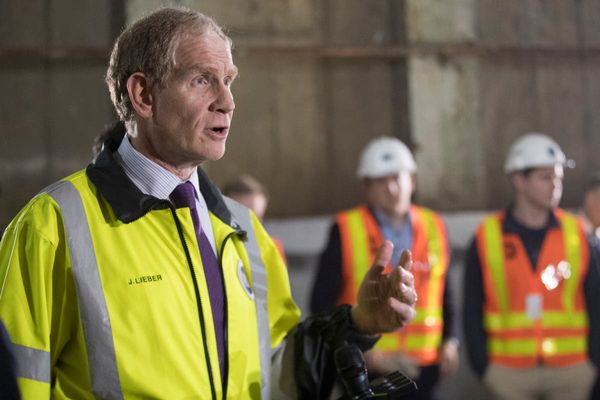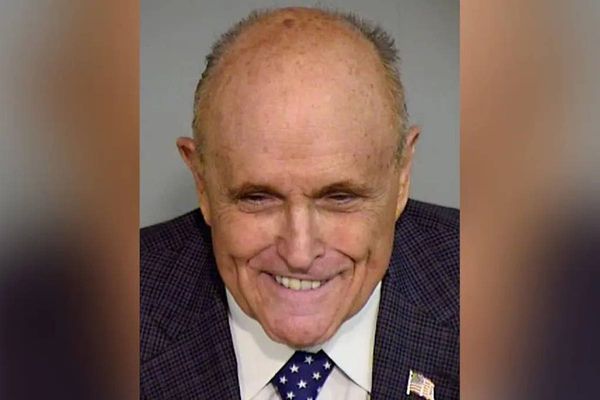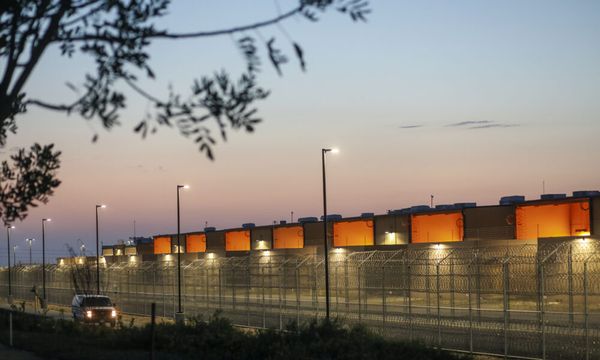
When parliament resumed this week, Anthony Albanese addressed one of the big questions that “emerged” over the mid-winter break.
Why exactly was he wearing a T-shirt to a Midnight Oil concert calling for “voice, treaty, truth”?
“Hold the front page,” Albanese joked in question time on Monday in relation to the shirt. Some took him literally and the joke got less and less funny as the week went on.
Treaty was the focus of question time again on Tuesday, with the opposition cross-examining the prime minister on claims the voice referendum is “not about treaty”.
The story was kicked along again on Wednesday by newspapers reporting a push to add a commitment to Labor’s platform to “take steps to implement all three elements of the Uluru Statement from the Heart in this term of government”.
Albanese committed Labor to implementing the Uluru statement “in full” in his election victory speech in May 2022. As Uluru statement architect Megan Davis eloquently noted, “none of this is secret” as information about the voice and treaty has been “in plain sight” for years.
While the addition of “this term” to the platform is certainly a newsworthy increment, it must be reported in the context of the fact the Albanese government already gave $5.8m in the October budget “to commence work on establishing an independent Makarrata commission to oversee processes for agreement making and truth telling”.
When Peter Dutton moved to suspend standing orders on Thursday, he accused Albanese of being “shifty on whether a treaty is being worked on” for not saying how it is being spent.
Dutton laboured the point with another reference to the T-shirt, suggesting Albanese is effectively saying “‘how did this T-shirt find itself on my body?” and it is “insincere” to put distance between himself and treaty.
It is arguable that facts like Albanese wore a treaty shirt, Albanese supports the Uluru statement, and Labor has given funding for a Makarrata Commission are not very newsworthy because they lack currency.
These things don’t simply “emerge” – they are resurfaced by the opposition and imbued with a renewed significance by reporting in the context of the referendum debate. Putting the second and third planks of the Uluru statement back in front of the public creates a problem for Albanese, requiring him to disentangle them from the voice.
Albanese hasn’t done a very good job of that. On Wednesday, when asked on Radio National if he will move to trying to negotiate a treaty or treaties, he replied “no” .
Albanese noted that the Uluru statement doesn’t refer to a single treaty, nor does it say that the commonwealth should be the one to negotiate treaties.
True enough, but in order to sidestep the scare campaign, it sounded like the prime minister was retreating from a commitment, further fodder for Dutton on Thursday to argue he is being insincere.
Albanese argued in parliament and will say at the Garma festival that it is “more and more obvious that the no campaign are desperate to talk about anything but the actual question before the Australian people”.
It is “indefensible” to argue against a voice that will help government close the gap in outcomes between Indigenous and non-Indigenous Australians, he will argue on Saturday, which is why opponents are instead attacking straw men.
How does Albanese hope to win a referendum with flagging polls and extraneous debates denying him clear air to argue the voice is just about constitutional recognition and listening to improve outcomes?
At Garma, he explains that “respectful, genuine discussions Australians have with one other” will be “what will decide this referendum”.
The director of Yes23, Dean Parkin, is counting on the same: an army of 20,000 volunteers to directly engage with voters.
The voice campaign will rely on direct conversations because so far those mediated through other sources don’t seem to be getting the job done.
Albanese tries to make the case for the voice by speaking directly to listeners of radio stations all around Australia, but has been frank at times about what he perceives as the media’s failings.
These are allowing voters to be “confused” about the extent of Indigenous Australians’ support for the voice and not always being responsible by raising “red herrings” in the debate.
Yes campaigners will have their work cut out for them.
Dutton reassures that the “Australian public are not hard-hearted” and it is not that they “don’t want to support Indigenous Australians”. Rather, they are responding to the prime minister “wilfully withholding detail from them”, he said on Thursday.
Perhaps Dutton’s success so far in driving down support for the voice has come from directing attention away more egregious forms of disadvantage – the eight-year gap in life expectancy between Indigenous and non-Indigenous Australians, suicide rates twice as high – and towards novel ones, the deprivation of detail about the design of the voice.
There are more intellectually honest ways of having this argument. Dutton could simply have said: although treaties aren’t on the ballot, a no vote will stop them before the idea catches on.
But that would force voters to confront whether the real motive of the no campaign is to stop the long, slow walk of reconciliation.
Far better for opponents to frame the referendum as a judgment on a prime minister with something to hide when, in fact, the destination of treaties and truth-telling have always been clear.







